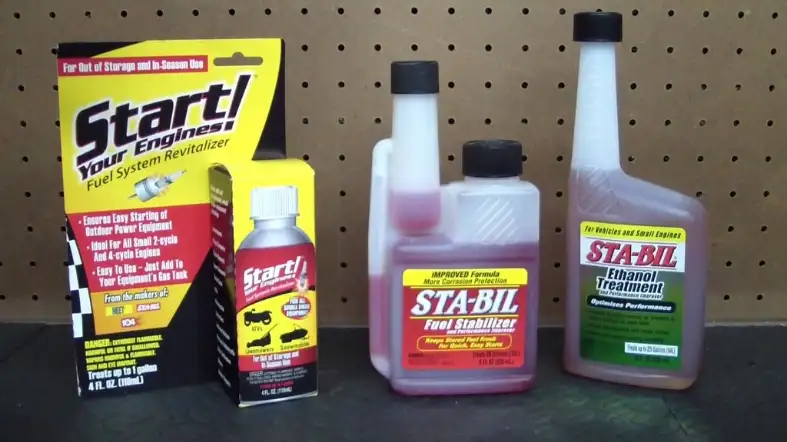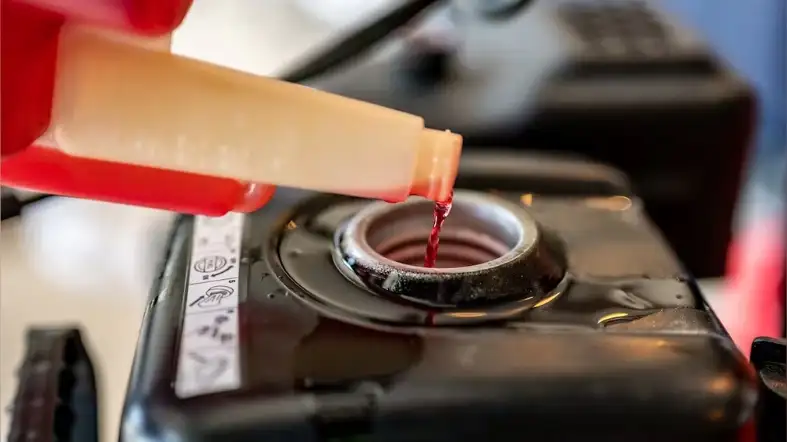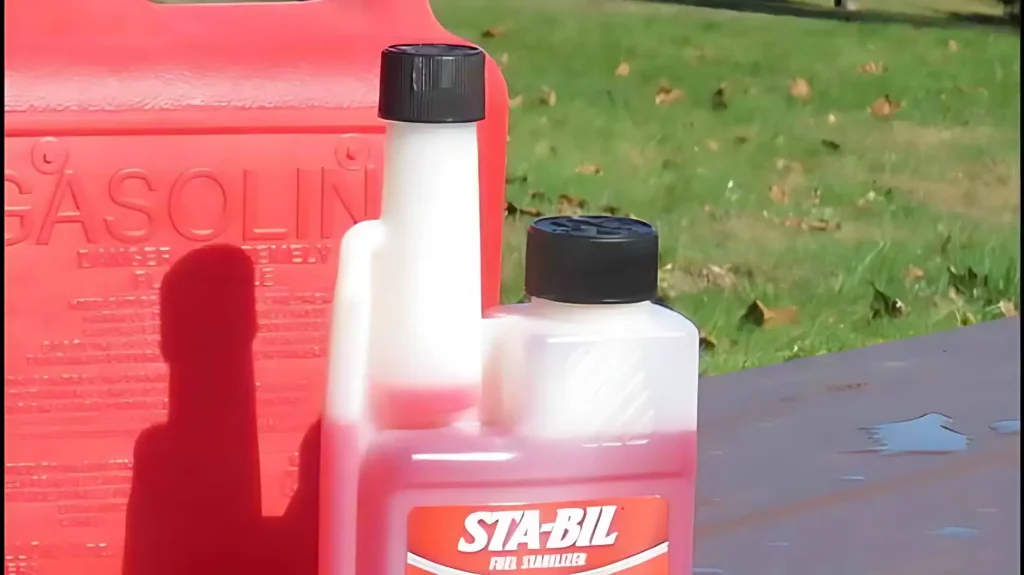Using Sta-Bil or any other fuel stabilizer in a two-cycle engine is a commonly debated topic.
Two-stroke engines operate differently from four-stroke engines and have unique fuel requirements.
While some people believe that using a fuel stabilizer like Sta-Bil can be beneficial for two-cycle engines, others argue that it can cause harm. So, is it safe to use Sta-Bil in a two-cycle engine? Let’s find out.
Can you use stabil in 2 cycle?
Yes, Sta-Bil can be used in 2-cycle engines to prevent deterioration of the gasoline component of the fuel mixture. It is recommended to add it in the correct ratio as specified on the product label to ensure stable and fresh fuel for better engine performance, especially during long off-season storage periods.

How to use Stabil in a 2-cycle engine?
Here’s a step-by-step guide on how to use Sta-Bil in a 2-cycle engine:
Step 1: Check the manufacturer’s instructions
Before using any fuel stabilizer, it is important to check the manufacturer’s instructions to ensure that you are using the product correctly.
Make sure that Sta-Bil is safe to use with your particular type of 2-cycle engine, and that you are adding the correct amount of product to your fuel mixture.
Step 2: Determine the correct Sta-Bil ratio
The correct ratio of Sta-Bil to add to your fuel mixture will depend on the specific product you are using.
Check the product label to determine the correct ratio. Sta-Bil typically recommends adding 1 ounce of product per gallon of fuel.
Step 3: Mix Sta-Bil into the fuel mixture
Once you have determined the correct Sta-Bil ratio, add the product to your fuel mixture.
Sta-Bil can be added directly to your fuel tank, or mixed into a separate container before adding it to the tank.
Make sure to mix the Sta-Bil thoroughly into the fuel mixture to ensure that it is evenly distributed.
Step 4: Run the engine
After adding Sta-Bil to the fuel mixture, run the engine for a few minutes to ensure that the product is evenly distributed throughout the fuel system. This will help to prevent any buildup or separation of the product.
Step 5: Store the equipment
Regular use of Sta-Bil in two-stroke fuel is particularly beneficial during the off-season when the equipment is stored for long periods.
After using your equipment, make sure to store it in a cool, dry place with a full tank of treated fuel.
This will help to prevent problems such as hard starting and poor performance when the equipment is next used.
When Should You Use a Fuel Stabilizer?

Here are some situations where using a fuel stabilizer can be beneficial:
1. Storing Fuel:
If you plan on storing fuel for an extended period, such as during the winter months, adding a fuel stabilizer is a good idea.
This will help prevent the fuel from degrading and protect your engine when you start it up again.
2. Infrequent Use:
If you use your vehicle or equipment infrequently, adding a fuel stabilizer can help keep your fuel fresh between uses.
This is especially important for small engines, such as those found in lawnmowers and generators.
3. Ethanol-Blended Fuel:
If you use ethanol-blended fuel, a fuel stabilizer is essential. Ethanol-blended fuel can absorb water, which can cause engine problems.
A fuel stabilizer can help prevent water absorption and protect your engine.
4. High-Performance Engines:
If you have a high-performance engine, using a fuel stabilizer can help protect it from damage caused by degraded fuel.
High-performance engines require high-quality fuel, and a fuel stabilizer can help ensure that your fuel meets those standards.
Which Fuel Stabilizer Should I Use?
With so many fuel stabilizers available in the market, it can be confusing to choose the right one for your needs.
We will discuss different types of fuel stabilizers and their features to help you make an informed decision.
1. Ethanol-based Fuel Stabilizers:
Ethanol-based fuel stabilizers are designed specifically to protect the fuel from the effects of ethanol.
Ethanol is known to attract moisture, which can cause the fuel to degrade and form deposits.
Ethanol-based stabilizers contain a combination of ingredients that prevent the formation of deposits and protect the engine from rust and corrosion.
2. Non-Ethanol Fuel Stabilizers:
Non-ethanol fuel stabilizers are designed to protect the fuel from the effects of oxidation, which is the main cause of fuel degradation.
These stabilizers contain antioxidants that prevent the fuel from breaking down and forming deposits.
Non-ethanol stabilizers are also effective in preventing the engine from rust and corrosion.
3. Marine Fuel Stabilizers:
Marine fuel stabilizers are designed specifically for boats and other marine applications.
These stabilizers contain a high concentration of corrosion inhibitors that protect the engine from rust and corrosion caused by exposure to saltwater.
Marine stabilizers also contain a combination of ingredients that prevent the formation of deposits and keep the fuel fresh for a longer time.
4. Diesel Fuel Stabilizers:
Diesel fuel stabilizers are designed specifically for diesel engines.
These stabilizers contain a high concentration of detergents that prevent the formation of deposits and keep the fuel clean.
Diesel stabilizers also contain a combination of ingredients that prevent the fuel from breaking down and protect the engine from rust and corrosion.
5. All-Purpose Fuel Stabilizers:
All-purpose fuel stabilizers are designed to be used in all types of fuel, including gasoline, diesel, and ethanol blends.
These stabilizers contain a combination of ingredients that prevent the formation of deposits, keep the fuel fresh, and protect the engine from rust and corrosion.
What are the potential risks of using Stabil in a 2-cycle engine?

While it is generally considered safe and effective, there are some potential risks associated with using Stabil in a 2-cycle engine. Here are some points to consider:
1. Clogging of the fuel system:
Stabil contains chemicals that can leave a residue in the fuel system, which can lead to clogging of the carburetor, fuel lines, and other components.
This can cause the engine to run poorly or not at all.
2. Overdosing:
If you add too much Stabil to your fuel, it can cause problems.
Stabil is designed to be used in specific ratios, and adding too much can cause your engine to run too rich, leading to fouled spark plugs, decreased performance, and increased emissions.
3. Reduced performance:
While Stabil is designed to preserve fuel, it can also reduce the octane rating of gasoline, which can lead to decreased performance and power output in your 2-cycle engine.
This can be particularly problematic for engines that require high-octane fuel to operate at peak efficiency.
4. Compatibility issues:
Stabil is designed to work with gasoline, but it may not be compatible with other fuels or additives that you might be using in your 2-cycle engine.
Mixing incompatible products can cause a range of issues, from reduced performance to engine damage.
5. Environmental impact:
While Stabil is generally safe for the environment, it is important to dispose of it properly.
Improper disposal can lead to contamination of soil and water, which can harm plants, animals, and humans.
Tips for maintaining a 2-cycle engine
As a lover of power tools and small engines, there’s nothing more frustrating than having a 2-cycle engine that won’t start or operate properly.
It can be challenging to troubleshoot and diagnose issues with these engines, but with proper maintenance and care, you can avoid most problems altogether.
We’ll discuss some tips for maintaining a 2-cycle engine, so you can keep your equipment running smoothly and avoid costly repairs.
1. Use the Right Fuel
The fuel you use is critical to the performance and longevity of your 2-cycle engine.
Always use the manufacturer’s recommended fuel/oil mixture, and never use straight gas or diesel.
The fuel/oil mixture lubricates the engine’s internal parts, and using the wrong mixture can cause engine damage or failure.
2. Check the Air Filter
The air filter on your 2-cycle engine needs to be cleaned to ensure proper airflow to the carburetor.
A dirty air filter can cause the engine to run rich, which can lead to fouled spark plugs, reduced power, and increased fuel consumption.
Check your air filter regularly, and clean or replace it as needed.
3. Use the Right Oil
The oil you use is just as important as the fuel. Always use high-quality, 2-cycle engine oil that meets or exceeds the manufacturer’s specifications.
Cheap or low-quality oil can cause engine damage or failure and can void your warranty.
4. Check the Spark Plug
The spark plug in your 2-cycle engine ignites the fuel/oil mixture, so it’s essential to ensure that it’s in good condition.
Check the spark plug regularly, and replace it if it’s dirty, damaged, or worn.
5. Don’t Overwork the Engine
2-cycle engines are designed to be lightweight and compact, making them ideal for handheld equipment.
However, they’re not designed to run continuously for extended periods.
Overworking the engine can cause overheating, which can lead to engine damage or failure.
6. Store the Engine Properly
Proper storage is essential for maintaining your 2-cycle engine.
Always store your equipment in a dry, secure location, and protect it from the elements.
If you’re storing your equipment for an extended period, it’s best to drain the fuel tank and run the engine until it’s out of fuel.
7. Follow the Manufacturer’s Maintenance Schedule
Finally, it’s essential to follow the manufacturer’s maintenance schedule for your 2-cycle engine.
Regular maintenance can help prevent costly repairs and ensure that your engine runs smoothly.
FAQs
Q: How Much Stabil Should I Use In My 2-Cycle Engine?
A: The recommended dosage for Stabil in a 2-cycle engine is 1 ounce per gallon of fuel.
Be sure to read the label on the bottle and follow the instructions carefully.
Q: Will Stabil Harm My 2-Cycle Engine?
A: No, Stabil is specifically designed to be safe for use in all types of gasoline engines, including 2-cycle engines.
It helps to prevent corrosion and deposits, and won’t harm the fuel system or engine components.
Q: How Often Should I Use Stabil In My 2-Cycle Engine?
A: You should use Stabil every time you fill up your fuel tank, especially if you don’t plan to use your equipment for a while.
This will help keep the fuel fresh and prevent any problems from developing.
Q: Can Stabil Fix A 2-Cycle Engine That Won’t Start?
A: No, Stabil is not a fuel system cleaner or engine treatment, and it won’t fix mechanical problems or issues with the fuel system.
If your 2-cycle engine won’t start, you may need to troubleshoot the problem and perform some maintenance or repairs.
Q: Is Stabil Expensive?
A: Stabil is an affordable fuel stabilizer that is widely available at most automotive and hardware stores.
The cost may vary depending on the size of the bottle and the retailer, but it’s generally not very expensive.
What is a fuel stabilizer and how does it work?
A fuel stabilizer is a chemical additive that you can add to gasoline or diesel fuel to help prolong its shelf life.
The purpose of a fuel stabilizer is to prevent the fuel from breaking down over time and becoming less effective or even unusable.
When gasoline or diesel fuel sits for an extended period of time, it can start to deteriorate and break down.
This can cause problems such as engine hesitation, hard starting, and even engine damage.
Fuel stabilizer works by slowing down the chemical reactions that cause fuel to break down, preventing it from losing its effectiveness over time.
Conclusion
The use of a stabilizer in a 2-cycle engine can be beneficial if used correctly.
Stabilizers can help to prevent the buildup of harmful deposits in the engine, which can lead to poor performance and damage over time.
However, it is important to use a stabilizer specifically designed for 2-cycle engines and to follow the manufacturer’s instructions carefully.
